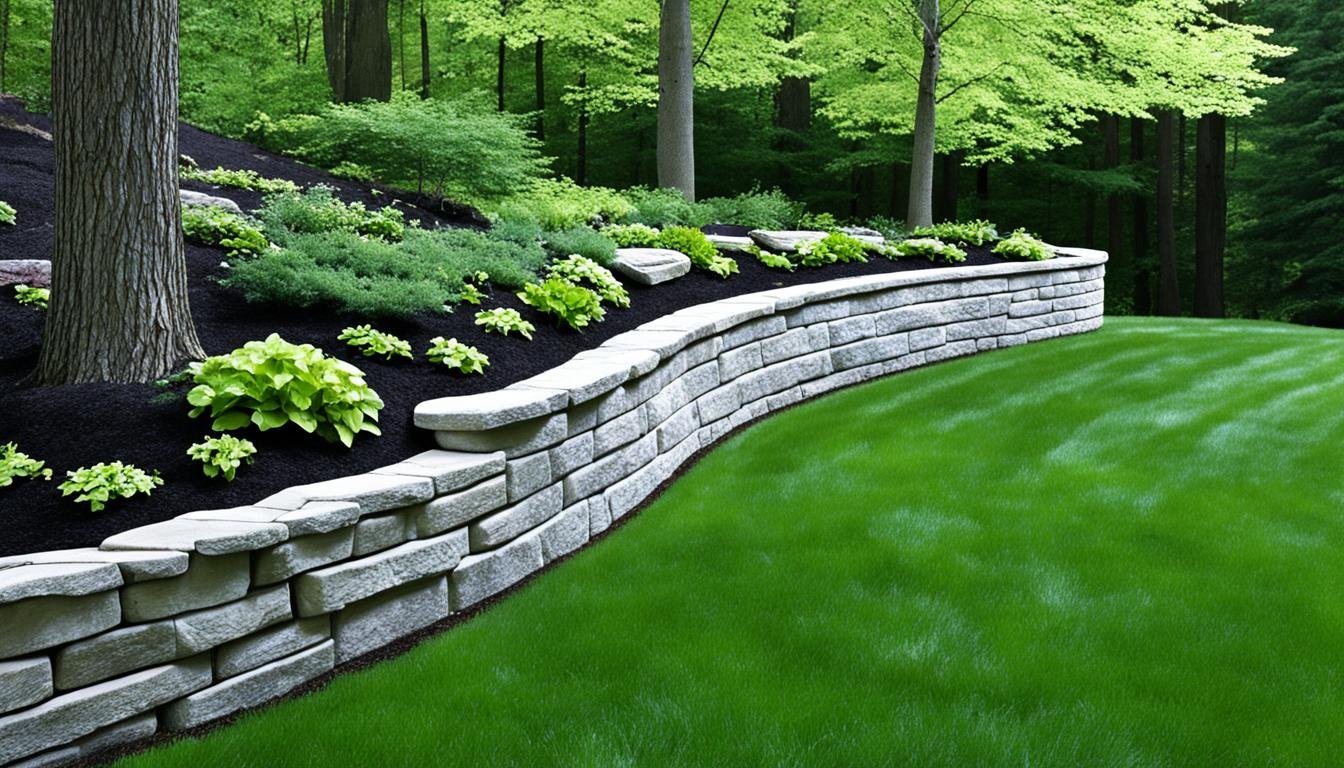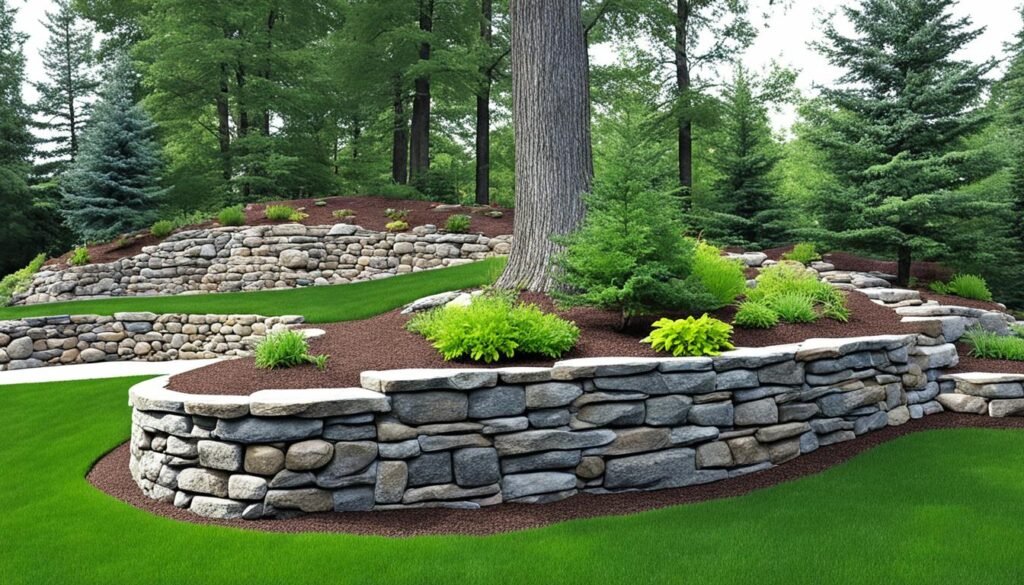
Did you know that installing a retaining wall around a tree can not only prevent flooding and soil erosion but also increase the value of your home? It’s true! Adding a retaining wall to your outdoor space not only provides practical benefits but also enhances the beauty of your landscape. Whether you’re a DIY enthusiast or seeking professional assistance from a hardscaping contractor, creating a tree-friendly retaining wall is within your reach.
When it comes to retaining wall block installation, it’s important to consider factors such as tree root protection, retaining wall block design, and overall aesthetics. In this article, we’ll guide you through the step-by-step process of installing a retaining wall around a tree, offer tips for creating a tree-friendly design, and provide expert advice from Local Landscaping Pro – Murrieta to help you achieve your tree landscaping ideas.
Key Takeaways:
- Installing a retaining wall around a tree adds value to your home and prevents flooding and soil erosion.
- Whether you’re a DIY enthusiast or prefer professional assistance, creating a tree-friendly retaining wall is achievable.
- Consider tree root protection, proper drainage, and retaining wall block design when installing a retaining wall.
- Local Landscaping Pro – Murrieta offers expert advice and assistance in designing and installing retaining walls for your tree landscaping.
- Follow our step-by-step guide for a successful retaining wall block installation around a tree.
Steps for Installing Retaining Wall Block Around a Tree
Follow these step-by-step instructions to install a retaining wall block around a tree in your outdoor space. These tips will guide you through the process of creating a stable and visually appealing wall that enhances the beauty of your landscape.
Step 1: Measure the desired distance from the tree
To start, measure the desired distance of the wall from the tree. Secure a piece of string to a large nail and pull it firmly to ensure a uniform distance in all directions.
Step 2: Create a level ring
Create a level ring around the tree with a diameter of three to six feet. This will be the base for your retaining wall.
Step 3: Spread gravel and level the base
Spread gravel over the base of the trench and ensure it is level. This will provide a stable foundation for your retaining wall block.
Step 4: Add the first row of stones
Add the first row of stones to the trench, making sure they are level and properly aligned. This will serve as the initial layer for your retaining wall block.
Step 5: Fill the space with rough gravel
Fill the space between the trench wall and the first row of stones with rough gravel. This will provide proper drainage for your retaining wall.
Step 6: Apply cement to cover the first layer
Mix and apply cement to cover the first layer of rocks. This will help bond the stones together and create a solid structure for your retaining wall block.
Step 7: Place the remaining layers of block
Place the remaining layers of block on top of the first layer, ensuring they fit snugly together. Continue stacking the blocks until you reach your desired wall height.
Step 8: Leave space at the top
Leave about a foot of space between the top layer of stone and the slope. This will allow for proper water drainage and prevent damage to the retaining wall block.
Step 9: Secure the top row with construction adhesive
Secure the blocks at the top row with construction adhesive. This will provide additional stability and ensure that the retaining wall block remains securely in place.
Step 10: Cure and backfill
Cure the wall by allowing it to dry and set for the recommended time. Once cured, backfill the wall with topsoil or compost to complete the installation.
By following these steps, you can successfully install a retaining wall block around a tree, enhancing the beauty and functionality of your outdoor space.
Tips for Building a Tree-Friendly Retaining Wall
When building a retaining wall around a tree, it is important to consider the following tips to ensure that the wall is tree-friendly and provides proper root protection.
Avoid Cutting Tree Roots
Avoid cutting tree roots if possible, as it can disrupt the tree’s stability and health.
Instead, build the wall past the farthest spread of the roots. By doing so, you can protect the tree’s root system from unnecessary damage and maintain the tree’s overall health and stability.
Be Cautious with Fill Soil
Be cautious of the tree’s root system when filling the space inside the wall.
Avoid using excessive fill soil, as it can smother the roots and cause damage. The tree’s roots need access to oxygen and proper drainage. It’s important to strike a balance between providing support for the wall and preserving the health of the tree.
Choose a Suitable Retaining Wall Block Design
Choose a retaining wall block design that allows for proper drainage and airflow to the tree’s root system.
The design of the retaining wall blocks is crucial in ensuring the long-term health of the tree. Opt for blocks that have built-in channels or gaps to allow water to drain and air to circulate through the root system. This will prevent waterlogging and reduce the risk of root rot.
By following these tips, you can build a tree-friendly retaining wall that not only provides the necessary support but also safeguards the health and stability of the tree.

| Benefits of a Tree-Friendly Retaining Wall |
|---|
| 1. Protects the tree’s root system from damage |
| 2. Enhances the aesthetics of your outdoor space |
| 3. Provides additional stability to the soil on slopes |
| 4. Mitigates the risk of soil erosion and flooding |
| 5. Increases the value of your property |
Conclusion
Installing a retaining wall block around a tree can be a fulfilling DIY project that not only enhances the visual appeal of your landscape but also provides functional benefits. By following the step-by-step guide and incorporating tree-friendly practices, you can create a sturdy and captivating wall that increases the value of your property.
However, if you prefer professional assistance or have more complex tree landscaping ideas in mind, consider reaching out to Local Landscaping Pro – Murrieta. Their team of experts can help you design and install a retaining wall that suits your specific requirements. Contact them at 951-309-9107 or visit their website at //landscapingcompaniesinmurrietaca.com/ for more information.
Whether you choose the DIY route or enlist the help of professionals, implementing a retaining wall block around a tree is a valuable investment that can transform your outdoor space into a stunning and functional oasis. So go ahead, unleash your creativity and bring your tree landscaping ideas to life!






No comment yet, add your voice below!